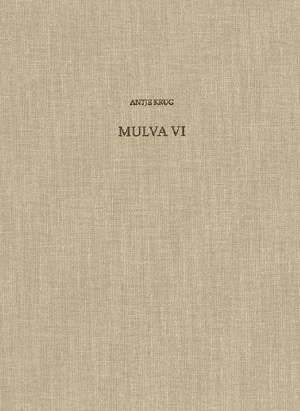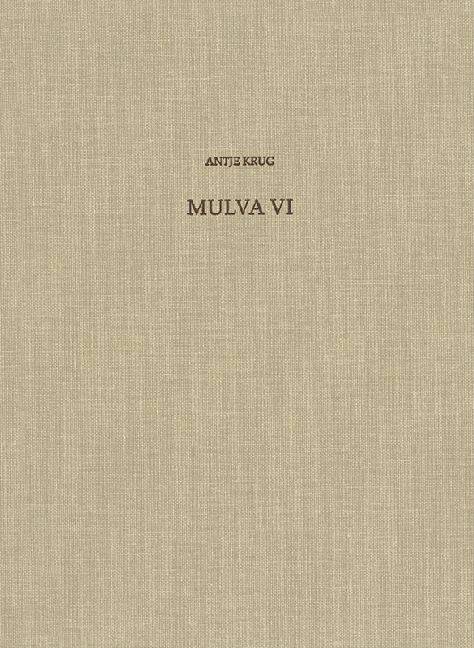
- Retrait gratuit dans votre magasin Club
- 7.000.000 titres dans notre catalogue
- Payer en toute sécurité
- Toujours un magasin près de chez vous
- Retrait gratuit dans votre magasin Club
- 7.000.0000 titres dans notre catalogue
- Payer en toute sécurité
- Toujours un magasin près de chez vous
Description
English summary: More than fifty years of excavation and research in the Municipium Flavium Muniguense, or Munigua (Mulva) have yielded a great number of minor objects. Those objects were found mainly without context and in fragmentary condition all over the city's area. Nevertheless, they give a glimpse into Munigua's history with its peak and gradual decline. Sporadic flint implements indicate that the hilltop of the settlement has been visited since Stone Age. Decorative elements of belts, a spur fastener, sporadic weapons and tools of Iberian-Turdetan period give evidence for the settlement's importance and its wealth founded on the mining of copper and iron. The promotion to the rank of a Municipium in the era of the Flavian emperors and the raising of monumental buildings of Roman type adorned with bronze statues of Roman emperors on top of the hill mark the zenith of this development. According to fragments found those statues have been intentionally turned into scrap metal in later centuries. But the minor objects consisting of fibulae, belt buckles, plates of inscriptions, writing implements, seal boxes, medical instruments, spindles and loom weights show a lively urban and globally networking daily life. Religious votives demonstrate the continuing cult of traditional indigenous deities. Fragments of furniture and gates give information about living beyond architectural remains. The transformation of once elegant houses into farmsteads and stables is the result of a change in the economic basis in later antiquity. The smelting of iron instead of copper was located within the city and even in the houses now abandoned. Traces of work were again discovered all over the city. In Migration Period only few people have lived around the hill. The Arabic Period is marked by horseshoes, locks, bolts and household objects. Maybe a number of mounted guards had been stationed on the far visible hill. German description: Die mehr als funfzig Jahre andauenden Ausgrabungen und Forschungen in dem Municipium Flavium Muniguense, oder Munigua (Mulva) haben eine sehr grosse Menge an Kleinfunden erbracht. Sie wurden, uberwiegend ohne Zusammenhang und nur fragmentarisch erhalten, uber das Stadtgebiet verstreut gefunden. Trotzdem vermitteln sie einen Uberblick uber die Geschichte des Municipiums mit seinen Hohepunkten und allmahlichem Verfall. Vereinzelte lithische Gerate zeigen, dass die Hugelkuppe schon seit der Steinzeit aufgesucht wurde. Iberisch-turdetanische Gurtelbeschlage, ein Spornhalter, einzelne Waffen und Arbeitsgerat sind Zeugnisse fur die Bedeutung der Siedlung und ihren Wohlstand, der aus der Kupfer- und Eisengewinnung erzielt wurde. Das setzt sich vom 1. Jh.v.Chr. an in romischer Zeit fort mit Trachtbestandteilen und verziertem Bronzegeschirr in italischem Stil, das wohl importiert wurde. Die Erhebung zum Municipium in flavischer Zeit und die Errichtung von Reprasentationsbauten romischen Typs auf der Hugelkuppe, die mit bronzenen Kaiserstatuen geschmuckt waren, bildeten den Hohepunkt dieser Entwicklung. Nach den aufgefundenen Fragmenten aber wurden in der spateren Kaiserzeit die Statuen systematisch verschrottet. Die Kleinfunde zeigen mit Fibeln, Gurtelschnallen, Inschrifttafeln, Schreibgerat, Siegelkapseln, Arztinstrumenten, Spindeln und Webgewichten ein lebhaftes urbanes und auch global vernetztes Leben an. Religiose Votive geben aber zu erkennen, dass zu allen Perioden die uberkommenen einheimischen Gottheiten weiterhin verehrt wurden. Teile von Mobeln, Portalen und Baukonstruktionen vermitteln Einzelheiten des Wohnens uber die Grundrisse von Stadthausern hinaus. Die Umwidmung der ehemals eleganten Hauser in Bauernunterkunfte und Viehstalle lasst erkennen, dass sich in der spateren Kaiserzeit die Wirtschaftsgrundlagen verandert hatten. Die Verhuttung von Eisen, das anstelle von Kupfer trat, fand zum Teil innerhalb der Stadt und in den Resten der Wohnhauser statt. Arbeitsspuren aus der spateren Zeit verteilen sich wieder uber das gesamte Stadtgebiet. In fruhgeschichtlicher Zeit gab es nach den geringen Funden nur noch wenige Bewohner. In arabischer Zeit war den Hufeisen, Schlossern, Riegeln und einigen Trachtbestandteilen zufolge vielleicht ein kleines berittenes Kontingent auf dem markanten Stadthugel stationiert.
Spécifications
Parties prenantes
- Auteur(s) :
- Editeur:
Contenu
- Nombre de pages :
- 436
- Langue:
- Allemand
- Collection :
- Tome:
- n° 36
Caractéristiques
- EAN:
- 9783954902378
- Date de parution :
- 27-06-18
- Format:
- Livre relié
- Format numérique:
- Genaaid
- Dimensions :
- 210 mm x 315 mm
- Poids :
- 2091 g

Les avis
Nous publions uniquement les avis qui respectent les conditions requises. Consultez nos conditions pour les avis.






